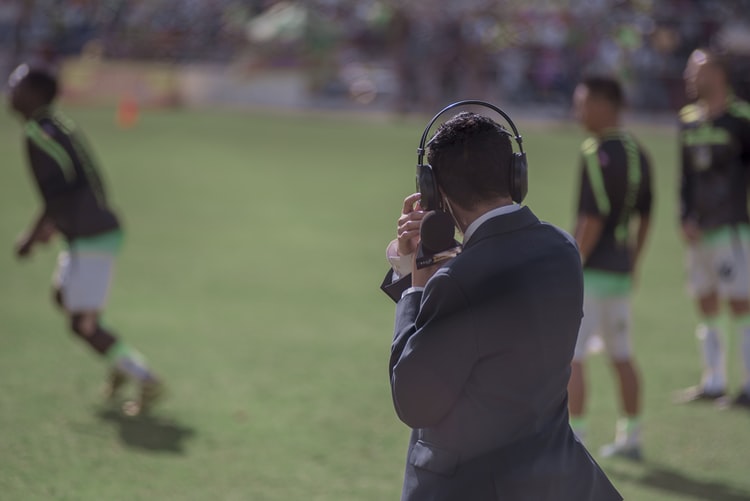Journalists are often thought of as smart and hard-working people, but why is it that sports journalists are often criticised and described as trivial or low status?
The famous American sports broadcaster Howard Cosell once said that “sports is the toy department of human life”. This expression came from the ideology that toys and play are not serious or important.
Over 60 years later and this phrase could not be more accurate. Sports journalists are still being criticised for their casual approach to work and cheerleading content in stories as opposed to being independent journalists that cover major issues.
The late English sports journalist and author Frank Keating described Australian journalists during the 2001 Ashes as being a “band of one-eyed fans with laptops and microphones”.
There is no doubt that the digitalisation of news media has changed the way that journalists operate. Most sporting bodies have their own in-house content teams that control their own messaging. This makes it difficult for news journalists to access players and ask their own questions.
Twitter has also become one of the main platforms that journalists use to connect with their audience and share their stories.
There are also negative consequences associated with using Twitter. A study by Amnesty International found that female journalists and politicians are abused on the platform every thirty seconds.
SBS World News Sports presenter and host Lucy Zelić was one of them. During her coverage of the 2018 World Cup in Russia she was abused for her correct pronunciation of football players’ names.
How is sports journalism similar to other interest journalism?
There are a range of fields that journalists can choose to work in including music, fashion, entertainment, business and more.
Although journalists usually have their own individual speciality, it is common for them to move into and cover other areas of interest journalism.
Ronny Lerner has been a sports and music journalist and editor since 2006. He agrees that there are parallels with sports and other interest journalism.
“There are definitely similarities between sport and music stories, especially articles based on one-on-one interviews,” he said.
The key objective of every journalist is to maintain ethical standards and strive to present accurate and well-balanced stories to inform the public.
Journalists are known as the “eyes and ears” for audiences. They need to have a deep knowledge of their focus area to report effectively as informed witnesses.
You have probably heard that good journalism starts with curiosity. Through thorough research and asking open-ended and follow up questions at press conferences, journalists can write better stories.

Taken by Soundtrap, from Unsplash.
Can sports journalism be improved?
Definitely. We can always do better.
On a positive note, I read a feature piece in The Age on Richmond Football Club’s premiership player Bachar Houli. The story was told through the eyes of two journalists who witnessed Houli being the first devout Muslim to play Aussie rules football at an elite level.
There is so much more to sport than just reporting on the game. We remember athletes by their performance in games, but we forget that they have their own stories to tell just like coaches and rising stars do too.
The International Sports Press Survey 2005 found that 58% of all articles in newspapers in ten countries focused on the results of current sports events and only 2.5% of sports pages covered sport’s social impact.
Yes, we still want to be updated with the latest sports coverage, but it’s also fascinating to read the stories behind the game that audiences aren’t familiar with. After all, sport is more than just sport.
Five-time NBA champion Kobe Bryant will always be remembered for his legacy on and off the court. His wife Vanessa recently accepted his admission into the NBA Hall of Fame and acknowledged him for inspiring people to achieve greatness.
“I want to thank him for somehow finding ways to dedicate time to not only being an incredible athlete, a visionary entrepreneur and storyteller but for also being an amazing family man,” said Vanessa.
In the USA sports journalism is more respected than in Britain or Australia. Perhaps this is because in the US sports journalists go beyond the scoreboard. They shed a light on cultural issues and write engaging sports profiles.
American sports and television pioneer Roone Arledge said that every person working in sports journalism owes a tremendous debt to Howard Cosell.
“His greatest contribution was elevating sports reporting out of daily play-by-play and placing it in the larger context of society.”
Featured Image: Photograph is of the Guatemalan National Championship. Taken by Feo con Ganas, from Unsplash.




Never a truer sentence written! “Sports journalists are still being criticised for their casual approach to work and cheerleading content in stories as opposed to being independent journalists that cover major issues.” Alex
I hadn’t given it much thought, but all the breaking NBA stories seem to start with a tweet. I think nearly every post on r/nba used to come from a Woj tweet for example.
I guess the next closest equivalent would be political reporting, where again a lot breaking news appears on Twitter, and there are also the feature interviews to show the human behind the public persona (and of course they get the “shut up and play” criticism too).
The attitude that sports journalism is ‘the toy department’ says more about those that hold the view than sports journalists and their craft. There are issues in sports journalism – lack of diversity (which is slowly changing), online bullying of journalists, and the boys club culture that has historically permeated much of sporting coverage – to name a few. Those that sweep sports journalism aside as silly and unimportant cut off opportunity to have a wider conversations about these very real issues. And, they totally ignore the massive communities that sports journalism unites and services. Thanks for this article Tash!
I definitely think sports journos should get a lot more respect than they do. Special interest journalism might not always be super-hard hitting investigative stuff, but there’s so much value in writing that is simply interesting and entertaining!
That said, there can be an overlap between sports journalism and more “serious” journalism. Russell Jackson’s work comes to mind – his piece about Robbie Muir from last year was incredible.
Wonderful, thought-provoking article, Tash. Given how deeply embedded sport is in Australian culture and the corresponding disdain with which most Australians view politics, the assumption sports journalists are not (or should not be) held in the same regard as political journalists is a striking paradox. I wonder, like you, how much that assumption is justified. Over the summer there were some beautifully written pieces on India’s victory over Australia in the test cricket — some bordered on the poetic — and yet all met the conventional tenets of objective journalism with precision. The same can be said of much of the Australian Open coverage.
I wonder if the assumption arises from a tendency some have to conflate or confuse sports commentators with sports journalists. Sports commentators are often drawn from the ranks of former sportspersons and lack a professional background in journalism. Perhaps it’s the perceived absence of professionalism on the part of some sports commentators which sustains this unfair characterisation of sports journalists.
Great article, Tash! Admittedly, I’m not very well-versed in sports journalism (or sports itself for that matter) so I had no idea that it was ever considered trivial. But I do love the point you made about there being so much more to sports than reporting the game. What comes to my mind is how other interest journalism groups have moved on from faceless features to exploring stories behind the individuals that constitute our industry. As a non-sport fan, these are the stories I’d certainly consider reading.
Very interesting article, Tash! I definitely agree that sports journalism isn’t as highly regarded as other specialist areas.
However, I think the fact that a lot of people consume sport as a form of entertainment is why sports journalists take a more light-hearted approach. If sports journalists and presenters were to cover the topic in a more serious way, fans may not enjoy the coverage as much and may not see it as entertaining.
Obviously, there are times when sports journalists are serious and cover news in a more stern way which shows how versatile they can be to switch the tones of the broadcast and keep their audience engaged.
Something I found interesting in your article was the mention of American sports journalists showing stories behind the games and cultural issues. I think this is something that could be further explored throughout Australian media and could be used as a subtle educational tool to make people more aware of important issues.
In a way I feel ill-placed commenting because I don’t have a huge affinity with sports, that said, I’m interested in humanity and community, two things that sport encompasses so well. The public can take away so much from a well-written story on sport, and those that don’t play or aren’t as involved, can develop more insight and understanding from a journalistic piece.
It’s interesting how a lot of ‘journalism’ is done in – house now. And I suppose in that way, it functions more like PR. But has those kinds of tabloid/celebrity/drama headlines that sports stars sometimes dominate contributed to the clubs closing their doors? I think back to our lessons on privacy and journalism and ethics here. It would make sense clubs would want to protect their players. And now with social media, players have to be media trained in these risky areas as well. I really hope the relationship between good journalists and sports players can grow and strengthen in trust, so more great, independent stories can flourish!
Nice one Tash!
I think I agree that the in-house reporting has lent itself to more of a PR style approach. I would be interested to find out whether this shift from sporting clubs to focus on their own Instagram/Twitter has more to do with audience engagement/clicks than anything else?
There are a mountain of important stories in sport that traverse all sorts of interesting themes. I think the best sport writers and journalists really nail this nexus in their writing or presenting. Great example by Sam of Robbie Muir ABC article. I absolutely love Martin Flanagan and Russell Holmesby too.
Lucy Zelic is a ripper example by you Tash. She asserted the value of multiculturalism in Australian society. She also highlighted the importance of sport as a platform for tolerance and awareness. I was actually at that World Cup in Russia and had just finished studying literature and translation in Spain. I absolutely loved that she was pushing the bounds of the Australian vernacular.
So true, Tash! Sports reporting is not just about “toys” – it can be about race, gender, politics financial inequity and so much more. I found the Lucy Zelic story so interesting. Would that criticism of her correct pronunciation been as harsh if she was a hard news reporter? A court reporter? Or is the ‘laidback’ perception of sport reporting what drove it? Or was it sexism? Either way, you’re completely right, there’s a long way to go for sport reporters and the public’s perception of them, both in Australia and around the world. Great article!